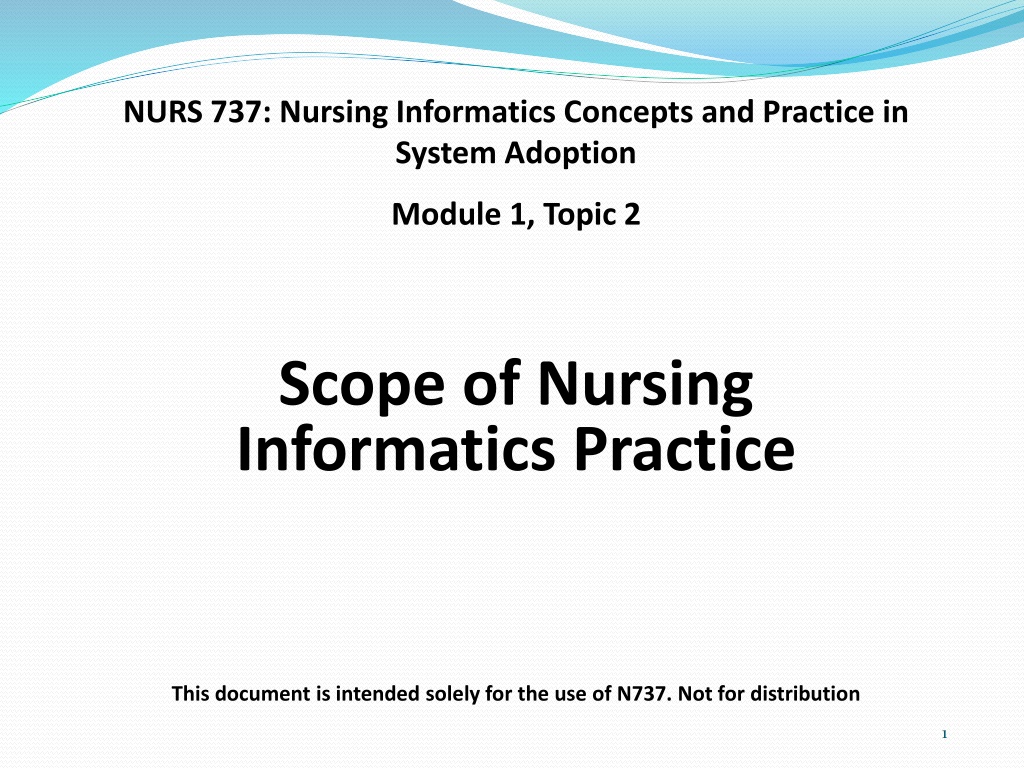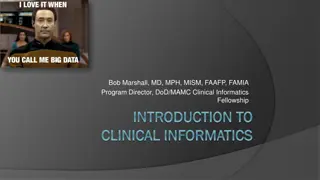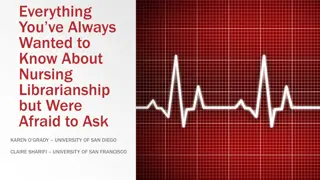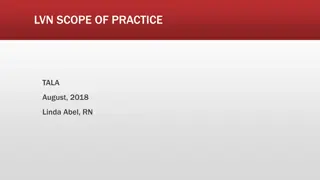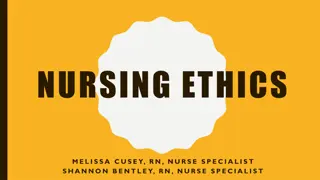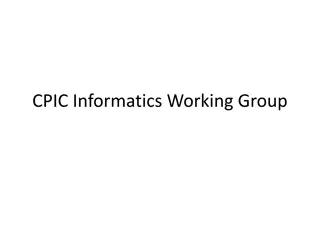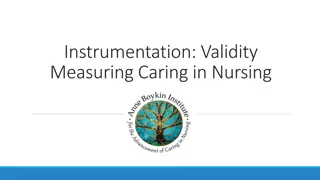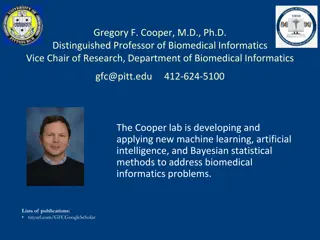Understanding the Scope of Nursing Informatics Practice
Nursing Informatics Practice encompasses the specialized roles, competencies, and standards that informatics specialists and nurses utilize to manage data, information, and knowledge in healthcare settings. It focuses on leveraging technology and NI tools to enhance decision-making and support nursing work, emphasizing information structure, design, and presentation. The specialty attributes of NI include differentiated practice, research programs, organizational representation, educational programs, and credentialing mechanisms.
Uploaded on Oct 08, 2024 | 0 Views
Download Presentation

Please find below an Image/Link to download the presentation.
The content on the website is provided AS IS for your information and personal use only. It may not be sold, licensed, or shared on other websites without obtaining consent from the author. Download presentation by click this link. If you encounter any issues during the download, it is possible that the publisher has removed the file from their server.
E N D
Presentation Transcript
NURS 737: Nursing Informatics Concepts and Practice in System Adoption Module 1, Topic 2 Scope of Nursing Informatics Practice This document is intended solely for the use of N737. Not for distribution 1
Before get to the content, consider the following questions: All nurses handle data, information, and knowledge. Then, are all nurses informatics nurses? What makes us different from other nurses? INSs use computers, technology, and other NI tools and methods to support nursing work INSs focus on information structure, design, and presentation and on what that information can do to promote decision-making. 2
Scope of Nursing Informatics Practice Specialty Attributes: What makes NI a specialty? Functional areas: Roles of Informatics Nurse Specialists Informatics Competencies Standards of Nursing Informatics Practice Professional Performance 3
Scope of Nursing Informatics Practice Nursing Informatics Specialists (INSs): those formally prepared at the graduate level in informatics or a related field Informatics Nurses (INs): those generalists who have gained experience in the field but do not have educational preparation at the graduate level in an informatics-related area. (ANA, 2015) ANA NI Scope and Standards of Practice is currently under revision 4
Scope of Practice Specialty Attributes Differentiated practice Defined research program Organizational representation Educational programs Credentialing mechanism 5
Specialty Attributes Differentiated practice The NI specialty is interested in the structures and algorithms of data, information, and knowledge used in nursing practice NI is also interested in representation and inclusion of nursing data in electronic processing 6
Specialty Attributes Organizational representation At least one organization must represent a specialty NI has several AMIA NI-WG (https://www.amia.org/programs/working-groups/nursing- informatics) American Nursing Informatics Association (ANIA) (https://www.ania.org). Technology Informatics Guiding Educational Reform (TIGER, https://www.himss.org/professionaldevelopment/tiger- initiative) 7
Specialty Attributes Educational programs Graduate UMSON was the first (Degree: MSN in Nursing Informatics) University of Utah Many nurses are choosing health informatics and other areas to acquire needed skills Certificate programs Many are available 8
Specialty Attributes Credentialing mechanism ANCCcredentials: INSs as generalists in NI (https://www.nursingworld.org/our-certifications/informatics- nurse/) Credential awarded: RN-BC Eligibility criterion for our students: - Refer to a criterion for an individual who completed a graduate program in nursing informatics 9
Functional Areas for Nursing Informatics ANA Scope and Standards of Practice (2015) Administration, leadership, and management Systems analysis and design Compliance and integrity Consultation Coordination, facilitation and integration Development of systems, products and resources Educational and professional development Genetics and genomics Information management/operational architecture Policy development and advocacy Quality and performance improvement Research and evaluation Safety, security, and environment Integrated Functional Areas: Telehealth and Informatics 10
NI New Position Trend: Examples Quality Measures Developer Senior System Administrator System Architect Telemedicine/ Telehealth Nurse Coordinator Vice President, Chief Information Officer Vice President, IT Operations Chief Nursing Informatics Officer Clinical Transformation Analyst Data Analyst Clinical Safety Analyst EHR Regulatory Compliance Specialist Health Informaticist/Analyst
Functional Areas for the INS Varying nursing Roles in Informatics by HIMSS: 2020 HIMSS NI Workforce Survey (N=1,359) includes findings on Workplace Title, Education, Training Salary and Satisfaction Education and Experience Job Details Organizational Structure (https://www.himss.org/sites/hde/files/media/file/2020/05/15/himss_n ursinginformaticssurvey2020_v4.pd) 12
Evolution of Informatics Competencies Informatics competencies are a requisite for all registered nurses. The AACN, QSEN, TIGER, and ANA recommend essentials and competencies for informatics Quality and Safety Education for Nurses (QSEN) American Association of Colleges of Nursing (AACN) Technology Informatics Guiding Educational Reform (TIGER) Initiative American Nurses Association 13
Evolution of Informatics Competencies Quality and Safety Education for Nurses (QSEN) The goal of the 3 phases of the QSEN project is to address the competencies necessary to continuously improve the quality and safety of the healthcare systems in which nurses work. The group also proposed clarified competencies in the areas of knowledge, skills, and attitudes (KSAs). Phase I: Competencies needed for pre-licensure nursing education Phase II: Competencies needed for graduate and advance practice nurses. 14
Evolution of Informatics Competencies The American Association of Colleges of Nursing: The Essentials: Core Competences for Professional Nursing Education (2021, New) (https://www.aacnnursing.org/Portals/42/AcademicNursing/pdf/Essentials- 2021.pdf) A new model for nursing education Competency-based education 2-levels of nursing education: Entry-level professional nursing education and advanced-level nursing education Two-levels of nursing education Domains and Concepts Competences and Sub competencies 15
Evolution of Informatics Competencies The American Association of Colleges of Nursing: The Essentials (2021) (cont.) Ten domains: 1. Knowledge for Nursing Practice 2. Person-Centered Care 3. Population Health 4. Scholarship for the Nursing Discipline 5. Quality and Safety 6. Interprofessional Partnerships 7. Systems-Based Practice 8. Informatics and Healthcare Technologies 9. Professionalism 10. Personal, Professional, and Leadership Development 16
Evolution of Informatics Competencies Technology Informatics Guiding Educational Reform (TIGER) Initiative TIGER s aim is to fully engage practicing nurses and nursing students in the electronic era of healthcare. TIGER Competency model Basic informatics competency (based on the European Computer Driving License (ECDL) competencies) Information literacy (based on the American Library Association information Competency Standards) Information management (based on the EHR Functional Model) 17
ANA Scope and Standards of Practice (2015) Synthesis of Evolution of NI Competencies (ANA, 2015, p. 46) 18
ANA Scope and Standards of Practice (2015) Informatics Competencies for IN and INS While there are informatics competencies that are required by all nurses, there are other more complex competencies that are required only for INs and INSs Examples: Knowledge and skills sets to support meaningful use criteria. Ability to maintain and improve information technologies that can enhance practitioners ability to monitor patients and coordinate care remotely via telehealth. All these areas require informatics nurses and informatics nurse specialists to be involved in defining benefit versus impact. 19
Other Professional Organizations Contributing to NI Education and Competencies Informatics Competencies for IN and INS American Nurses Association (ANA) American Medical Informatics Association (AMIA) American Nursing Informatics Association (ANIA) Health Information and Management Systems society (HIMSS) Nursing Informatics Working Group 20
